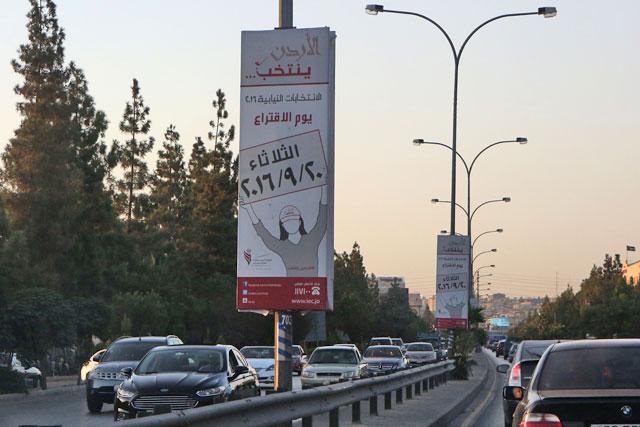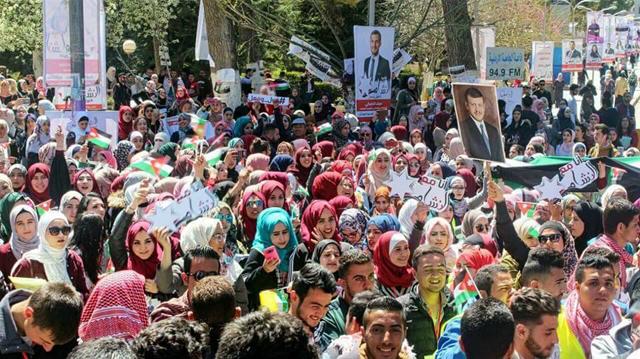You are here
Ministry officials, university deans discuss engaging student voters
By Suzanna Goussous - Aug 22,2016 - Last updated at Aug 22,2016

Cars pass by an Independent Election Commission advertisement on a street in Amman on Monday urging voters to participate in the September 20 elections (Photo by Khaled Oudat)
AMMAN — Officials from the ministries of youth and political and parliamentary affairs met with university deans on Monday to discuss ways to involve young people in the upcoming elections.
Minister of Youth Rami Wreikat stressed the role of young people in achieving reform and change and urged university administrations to “fill the gaps” regarding the political participation of students.
There are almost 1,027,000 Jordanians eligible to vote aged between 17 and 25, of whom many are university students, the minister said.
“The culture of electing and voting must be present at universities. Some students are interested in participating; some are not. Our role in the ministry and the government is to encourage the younger generation to get involved in the process,” he added.
Some 2,200,000 people were eligible to vote in the 2013 elections, but under the new Elections Law, some 4,100,000 are eligible to take part in the September 20 polls, the minister said.
The Elections Law lowered the voting age to 17, and discarded the requirement for citizens to register to vote.
“We must work towards endorsing the important role of voting for candidates from the social, political and academic levels,” he said.
Minister of Political and Parliamentary Affairs Musa Maaytah said that young people are the most important part of the electorate.
“As ministry and government officials, we have to raise awareness among students to inform them about the elections and the correct way of participating,” he said.
Maaytah added that officials, university administrations and deans should work together to support students’ political decisions and to give them the information needed to take part in the elections.
“They should be informed on the correct way of voting, based on the programme offered by candidates that fits their beliefs, not based on a tribal mindset,” he said.
Bilal Abu Rakhyeh, dean of student affairs at Al Hussein Bin Talal University, said only 32 per cent of students were expected to participate in the upcoming elections.
Several deans from different universities across the Kingdom voiced hope that the younger generation would be allowed to express their political views more “freely” on campuses.
Taleb Ababneh, dean of student affairs at Irbid University, said lectures on elections held at universities should be given from different perspectives, including social and cultural aspects, to change students’ thoughts on politics in Jordan.
“Democracy doesn’t happen overnight, especially in a tribal society. Tribes are still being referred to as a political ideological source, this should be changed as well,” Ababneh added.
Officials from Karak’s Mutah University and Tafileh Technical University said residents of Amman are more receptive to ideas and lectures on elections than those living in other governorates.
“In Amman, it is easier to convince students to vote for someone for the programme offered, but in other governorates, it is more challenging to discuss the voting procedure with students; they are still controlled by the tribal mindset,” the Tafileh university representative said.
Other university officials suggested using social media networks to reach a higher number of students and to raise awareness among their age group.
Rami Salem, Princess Sumaya University for Technology’s dean of student affairs, said that since social media is popular among the younger generation, each university could create a page for its students to share informative articles, videos, or student interviews with candidates.
Sharing videos and interviews would motivate and encourage students to support candidates according to their programmes, he added.
There are 32 public and private universities in Jordan, according to university officials.
Maaytah said the ministry has been working with Al Hayat Centre for studies (RASED), the Independent Election Commission, ActionAid and university administrations and student unions for the last two months to spread political awareness through seminars and conferences.
Related Articles
AMMAN — Independent Election Commission (IEC) Chief Commissioner Musa Maaytah on Wednesday emphasised the importance of enhancing the
AMMAN — Students’ union elections at the University of Jordan (UJ) on Thursday recorded a 54.7 per cent turnout, lower than the last 2015 el
AMMAN — Empowering youth in public work is a priority that aligns with fostering their involvement in political party activities, Independen













